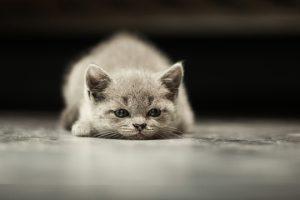Why your cat might vomit…
 One of the common causes is Inflammatory Bowel Disease (IBD).
One of the common causes is Inflammatory Bowel Disease (IBD).
Diet and Nutrition are of increasing interest to cat owners (it has always totally fascinated cats!), and as we all move further from a “natural state”, new problems appear.
The following is a small segment on a huge topic.
There is no getting away from the fact that the perfect diet for cats is mice. Their predatory powers was what encouraged the Egyptians to accommodate them in their houses and grain silos thousands of years ago, and even today, about one-eighth of Australia’s grain crops goes into rodents rather than the international markets! However, most modern town cats lead a rather more regal existence, and hunting is a recreation rather than a raison d’être, so humans must recreate a diet which fulfils all of a cat’s dietary requirements.
First came the tinned foods, and cats trained their owners as to which were worthwhile purchasing (by refusing to consume lesser quality offerings). Feline nutritional needs are much more highly refined than dogs or humans, particularly in regard to protein quality and quantity – it is not metabolically worthwhile for a cat to eat a food of less than 20 percent protein (of “dry matter” – if you look at tinned food, it is 80 percent water, so the protein quoted is really quite high in the better quality products). The move to dried foods has resulted in production of high proteins levels to reflect this requirement also. Now comes the interesting part. In order to entertain owners and cats, colourings, flavourings and preservatives have been added to most tinned and dried foods, particularly the cheaper “supermarket” products. In fact, often the “flavour” is only sprayed on the outside of the biscuit, to minimise the use of the expensive parts of the formula.
Cats can cope with a lot of things, but it seems that they draw the line at “additives”. Vets are seeing an increasing number of cats who vomit up their food(and some of the colourings in the dried food actually stains the carpet (so what is it doing to the cats’ intestines?), and who only need to be converted to a high quality, (preferably preservative free) dried food to improve. Eliminating tinned food from the diet, and feeding ‘real human grade’ roo, chicken, turkey or pork (not beef or tuna) instead is part of the strategy. There is a product from New Zealand called Ziwipeak – and as you’d expect, the tinned and dried varieties are both excellent for cats, and come in three flavours even! The dried ‘jerky’ is a bit of a texture shock for most adult cats and they are reluctant to eat it. However, starting your young cat out on it is an excellent choice.
Dr Kim has a lot more excellent information about IBD on her Feline Friendly Care website

